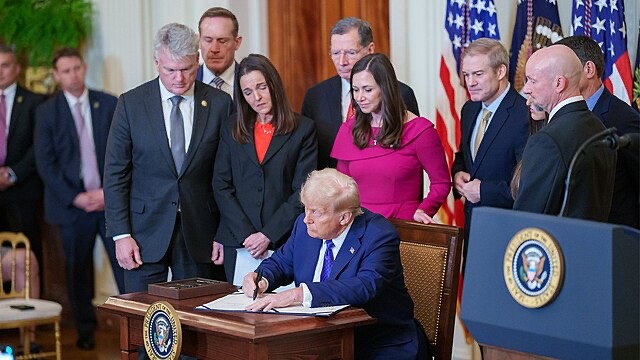A Legal Showdown Over Deportations
In a high-stakes clash between judicial authority and executive action, several officials from former President Donald Trump’s administration are facing potential criminal contempt charges after allegedly defying a federal court order halting the deportation of Venezuelan migrants. The case, centered on deportation flights carried out despite a judge’s injunction, is drawing intense scrutiny and raising major constitutional questions about the separation of powers and the limits of presidential authority.
At the heart of the case is a ruling by U.S. District Judge James Boasberg, who found “probable cause” to believe that government officials willfully disregarded his March 15 order barring the deportation of individuals under the Alien Enemies Act, a rarely used statute dating back to 1798. Despite this order, deportation flights proceeded, triggering a legal firestorm.
This article breaks down the legal stakes, political ramifications, and what this could mean for the future of immigration enforcement in the United States.
The Court Order That Sparked the Controversy
Judge Boasberg’s Injunction and Its Legal Basis
On March 15, 2025, Judge Boasberg issued a federal injunction blocking the deportation of certain Venezuelan nationals, citing concerns over the administration’s use of the Alien Enemies Act. The law, originally intended for use during wartime, allows the president to detain or remove nationals from hostile foreign states—but legal experts have long questioned its application in modern-day immigration cases.
Boasberg’s ruling emphasized that the administration had failed to provide adequate justification for invoking the law against migrants with no proven criminal affiliations or ties to hostile activities. The court found the actions arbitrary and lacking due process protections.
The Use of the Alien Enemies Act
Originally signed into law in 1798, the Alien Enemies Act was designed during the Adams administration to allow the U.S. government to deport foreign nationals from countries it was at war with. Although it remains on the books, it is rarely invoked, and its application in this case has drawn criticism from legal scholars and human rights advocates.
The Trump administration’s argument? That Venezuelan migrants, some with alleged gang affiliations, posed national security threats. Critics, however, view it as a political tool to advance a hardline immigration agenda.
Deportation Flights Go Ahead Despite Federal Block
Government’s Justification: “Flights Already in the Air”
In defiance of the judge’s order, deportation flights carrying Venezuelan detainees departed for El Salvador just hours after the injunction was issued. Government officials later claimed the flights had already left U.S. airspace at the time the court’s order was received, suggesting there was no opportunity to comply.
However, Boasberg rejected this explanation, describing it as “disingenuous” and “indicative of a broader pattern of noncompliance with lawful judicial orders.” The judge cited internal government communications suggesting knowledge of the order before takeoff.
Court’s Response: A “Willful Disregard” of Judicial Authority
In a scathing ruling issued days later, Judge Boasberg wrote that the administration had shown “a willful disregard for this court’s authority.” He found sufficient cause to pursue criminal contempt proceedings against those involved—an exceedingly rare step in immigration enforcement cases.
The ruling included references to previous warnings given to Trump-era officials, suggesting a long-standing pattern of defiance toward judicial constraints on deportation efforts.
Criminal Contempt Charges: What They Mean
Definition and Consequences of Criminal Contempt
Criminal contempt of court involves the intentional disobedience or disrespect of a court’s authority. It can result in fines, imprisonment, or both. In this case, the charge hinges on whether officials knowingly violated a binding legal order—a serious offense with constitutional implications.
Unlike civil contempt, which seeks to compel compliance, criminal contempt punishes past disobedience and is considered a crime against the judicial system itself.
Who Could Be Held Responsible?
Though the court has not named specific individuals, speculation centers on several high-ranking DHS and DOJ officials from the Trump era. If the Department of Justice declines to prosecute, Judge Boasberg has the authority to appoint a special prosecutor, potentially creating a historic confrontation between branches of government.
Department of Justice’s Next Move
Will the DOJ Prosecute?
As of now, the Department of Justice under President Biden has not committed to taking action. Legal observers suggest that a DOJ prosecution would mark a significant shift in how judicial defiance is handled post-administration.
But politics loom large. Prosecuting Trump-era officials could further polarize an already divided political climate.
Independent Prosecutor Possibility
In the event the DOJ declines to prosecute, Boasberg has signaled he may appoint an independent special prosecutor—a rare but legally permissible step under federal law. This move would ensure the case proceeds regardless of political pressure, though it could face challenges from Trump’s legal team.



